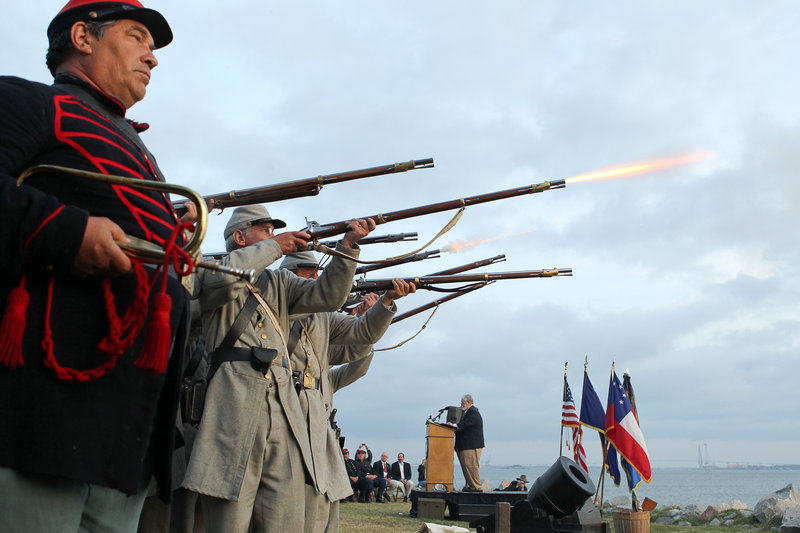CHARLESTON, S.C. — America’s bloodiest war was commemorated here Tuesday with booming cannons, plaintive period music and hushed crowds, continuing to underscore a racial divide that had plagued the nation since before the Civil War.
The events marked the 150th anniversary of the Confederate bombardment of Union-held Fort Sumter in Charleston Harbor, an engagement that plunged the nation into four years of war at a cost of more than 600,000 lives.
Several hundred people gathered on Charleston’s Battery in the pre-dawn darkness, much as Charleston residents gathered 150 years ago to view the bombardment of April 12, 1861.
About 4 a.m., a single beam of light reached skyward from the stone works of Fort Sumter. A half-hour later, about the time the first shots were fired, a second beam glowed, signifying a nation torn in two.
Nearby, a brass ensemble played a concert titled “When Jesus Wept” as hundreds listened, some in folding chairs, others standing.
Fifty years ago during the centennial of the Civil War, there was a celebratory mood. But Tuesday, the 150th anniversary events were muted. Even the applause seemed subdued.
At the White House, President Obama captured the somber mood in a proclamation that the date would be the first day of the Civil War Sesquicentennial.
“On this milestone in American history, we remember the great cost of the unity and liberty we now enjoy, causes for which so many have laid down their lives,” the statement released by the White House said.
Alluding to the war’s ultimate end in 1865, Obama added: “When the guns fell silent and the fate of our nation was secured, blue and gray would unite under one flag and the institution of slavery would be forever abolished from our land.
“We are the United States of America — we have been tested, we have repaired our Union, and we have emerged stronger,” his proclamation said.
Of about 1,200 people attending two main commemorative events Tuesday, only a handful were black. One man whose Confederate ancestor is credited with firing the first shot of the war acknowledged his family legacy as a “mixed blessing.”
“I think it signifies the mood of the nation. I think we’re much more sensitive to other people and the diversity in this country,” Linda Marshall, a 58-year-old registered nurse from Charleston, said as she waited for the second beam of light as dawn creeped up.
A little over two hours later, as a red sun rose on James Island across the harbor, Confederate re-enactors fired an authentic 1847 seacoast mortar, signaling about 30 other cannons ringing the harbor. Those cannons quickly thumped, and smoke rose in a re-enactment of the Sumter bombardment.
In a dispatch to The Associated Press in 1861, an unnamed correspondent observed the fort’s parapets crumbling under the pounding of artillery. He wrote of gun emplacements being “shot away” and shells falling “thick and fast.”
“The ball has opened. War is inaugurated. … Fort Sumter has returned the fire and brisk cannonading has been kept up,” the dispatch said.
Sumter fell after a 34-hour bombardment.
Later in the morning, Danny Lucas, 53, who is black, was walking out after visiting Charleston’s Old Slave Mart Museum, where the history of Charleston’s role as an urban slave-trading center is recounted.
“I have no problem with the Civil War being honored as long as it is inclusive,” said Lucas, a resident of Ridgeland, S.C. “I don’t think whites should be so defensive, and I don’t think blacks should feel they are unwelcome to these kinds of things. I think it will fade over time.”
Lucas does think last December’s secession ball in Charleston, during which South Carolina’s departure from the Union was commemorated, may have soured some blacks on the 150th events.
State Sen. Glenn McConnell, president pro tempore of the South Carolina Senate and a Civil War re-enactor, told the audience of about 700 on James Island that the effects of the war are still being felt.
“The War Between the States triggered generations of disputes and controversies between regions, races and cultures,” he said.
But he said the South has moved on and “the time has come to move beyond the petty disputes of the past.”
Later, a black Union re-enactor representing a soldier from the 54th Massachusetts, the company of black troops that fought at Battery Wagner on Charleston Harbor in 1863 in an attack memorialized in the movie “Glory,” threw a wreath into the water and saluted
Then seven re-enactors in Confederate gray fired a 21-gun salute in memory of all who died on South Carolina soil. Two buglers then echoed “Taps.”
As the event broke up, a small group of Confederate re-enactors in the back of the crowd took up singing “Dixie,” although only a handful joined them and not very enthusiastically.
Copy the Story Link
Send questions/comments to the editors.



Success. Please wait for the page to reload. If the page does not reload within 5 seconds, please refresh the page.
Enter your email and password to access comments.
Hi, to comment on stories you must . This profile is in addition to your subscription and website login.
Already have a commenting profile? .
Invalid username/password.
Please check your email to confirm and complete your registration.
Only subscribers are eligible to post comments. Please subscribe or login first for digital access. Here’s why.
Use the form below to reset your password. When you've submitted your account email, we will send an email with a reset code.